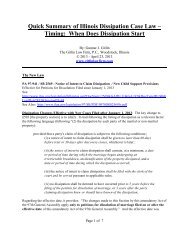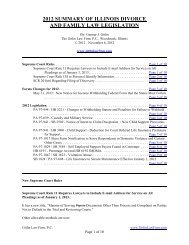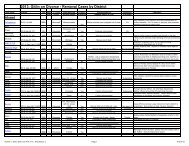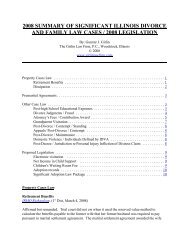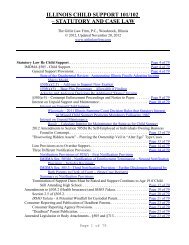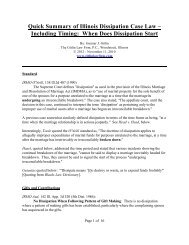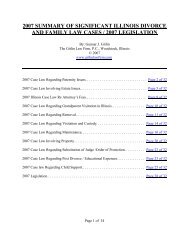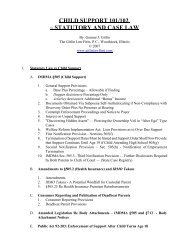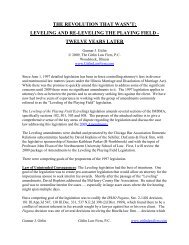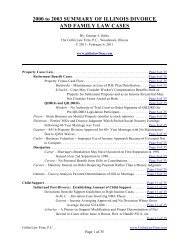Gitlin Law Firm 2008 Illinois Divorce and Paternity Case and ...
Gitlin Law Firm 2008 Illinois Divorce and Paternity Case and ...
Gitlin Law Firm 2008 Illinois Divorce and Paternity Case and ...
You also want an ePaper? Increase the reach of your titles
YUMPU automatically turns print PDFs into web optimized ePapers that Google loves.
Code stemming from the time when QILDROs were not allowed. The 1993 settlement<br />
agreement stated in part:<br />
As a part of the distribution of marital property, the parties will divide evenly<br />
JOHN B. SCHURTZ' accrued retirement pension benefits as of September 16,<br />
1993, if, as, <strong>and</strong> when received by him. * * * In the event a Qualified Domestic<br />
Relations Order is lawfully able to be entered in the future with regard to said<br />
pension, each party will cooperate to the entry thereof."<br />
In late 2004, when the ex-husb<strong>and</strong> was 62 years old, he became unable to work as a firefighter<br />
<strong>and</strong> applied for disability benefits. The City of Peoria Fireman's Pension Board approved his<br />
application <strong>and</strong> he began receiving $4,374.00 per month in disability payments. In February<br />
2005, the ex-wife’s lawyer sent the ex-husb<strong>and</strong> a letter requesting consent to issue what should<br />
have been called a QILDRO (the decisions indicates the lawyer requested to issue a QDRO).<br />
When the ex-husb<strong>and</strong> refused, the ex-wife filed a petition for rule in which she sought to enforce<br />
to enforce the judgment. The decision discusses the ex-husb<strong>and</strong>’s testimony that he did not<br />
necessarily intend to retire although it was possible he could stay on disability as long as he<br />
lived therefore bypassing retirement benefits. The trial court granted the ex-wife’s petition for<br />
rule holding the disability pension to be a retirement pension consistent with the MSA. The exwife<br />
then filed a petition for fees per § 508(b) claiming that his failure to sign the consent for<br />
2<br />
issuance of a “QDRO” was “without cause or justification.” The court required the ex-husb<strong>and</strong><br />
to reimburse his ex-wife for payments he should have made but did not require pre-judgment<br />
statutory interest. The court denied the ex-wife’s request for attorney’s fees finding he had a<br />
good faith justification for his conduct.<br />
Schurtz has a good discussion regarding disability <strong>and</strong> retirement benefits. It states:<br />
When a pension plan provides disability benefits as well as retirement benefits<br />
<strong>and</strong> the marital settlement agreement refers only to "retirement" benefits <strong>and</strong> is<br />
silent as to disability payments, a court may reasonably interpret the agreement in<br />
one of two ways: (1) as a grant to the ex-spouse of a portion of any benefits<br />
received under the pension plan, or (2) as limiting the ex-spouse's interest in the<br />
pension plan to normal, age-related retirement benefits. *** When a pension<br />
plan provides disability benefits as well as retirement benefits <strong>and</strong> the marital<br />
settlement agreement refers only to "retirement" benefits <strong>and</strong> is silent as to<br />
disability payments, a court may reasonably interpret the agreement in one of two<br />
ways: (1) as a grant to the ex-spouse of a portion of any benefits received under<br />
the pension plan, or (2) as limiting the ex-spouse's interest in the pension plan to<br />
normal, age-related retirement benefits. This interpretation is reasonable because<br />
the disability pay is meant to replace the disabled ex-husb<strong>and</strong>’s income, not act<br />
as retirement pay. However, when an ex-husb<strong>and</strong> is entitled to receive retirement<br />
pay <strong>and</strong> is receiving disability income instead, a settlement agreement providing<br />
the ex-wife a portion of retirement benefits "can be reasonably interpreted in only<br />
2<br />
The mis-quote from the statute is noteworthy since §508(b) has used the phrase without<br />
“compelling” cause or justification since 1997 (at the time of the “Leveling” amendments.)<br />
The <strong>Gitlin</strong> <strong>Law</strong> <strong>Firm</strong>, P.C. Page 6 of 55 www.gitlinlawfirm.com




